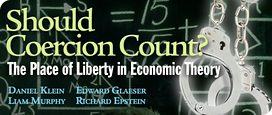Let me just make a few comments to the various objections that Liam Murphy has raised to the definitions of “liberty” in use in classical liberal theory. I do not think that the term “liberty” has the deep philosophical ambiguity that he attributes to it. A person does not become more free because he has more wealth; he becomes wealthier, which confers on him more opportunities to use the liberty that he has. Any system of wealth transfers from one person to another, moreover, cannot increase aggregate liberty, because if the transferees are made, by Murphy’s lights, better off, then the transferors are made worse off, so that we do not have the kind of social improvement that is derived, say, from voluntary contracts that typically produce gains to the parties and positive external effects as well.
The question therefore is whether we can justify the limitation on the classical liberal definition of liberty on the grounds that wealth transfers produce some kind of social improvement. That improvement cannot be found on a strong Paretian standard because of the losses to the parties from whom the transfers are made — an objection that cannot be made against voluntary gifts. The harder question is whether the case for transfers can be made on a Kaldor-Hicks standard whereby we think that the gains to the winners exceed the losses to the losers, such that in principle transfer payments could bridge the gaps. This is possible with changes that produce overall wealth increases, but is much harder to achieve with wealth transfers; even with the diminishing utility of wealth, we have to hand everything back to the loser to put that person back in the prior state of affairs.
The only way out of this problem is to assume that from some ex ante position there is a global insurance contract whereby everyone thinks that some protection against adverse states is better than no protection at all. Yet here too the obstacles are severe because we know that, in the real world, transfer payments are costly to administer; that they provoke partisan squabbles that produce political strife; and that they dull the incentives for production at both ends of the income scale. Another way to put the point is this: even if we thought that the diminishing marginal utility of wealth justified coercive transfers, the question we would have to ask is not whether $100 in the hands of the poor is worth more socially than $100 in the hands of the rich, assuming interpersonal comparisons of utility are permissible. Rather the question is whether $100 – X in the hands of the poor is worth $100 in the hands of the rich, and until we know X that is hard to answer. My own sense is that there is no categorical answer to this question, but that politically the transfers will move either in the wrong direction, or will be larger than is optimal. There is no categorical case against redistribution as a deviation from libertarian conceptions of liberty, but it is a hard row to hoe to find transfer systems that do work. The minimum wage is not one of them.

